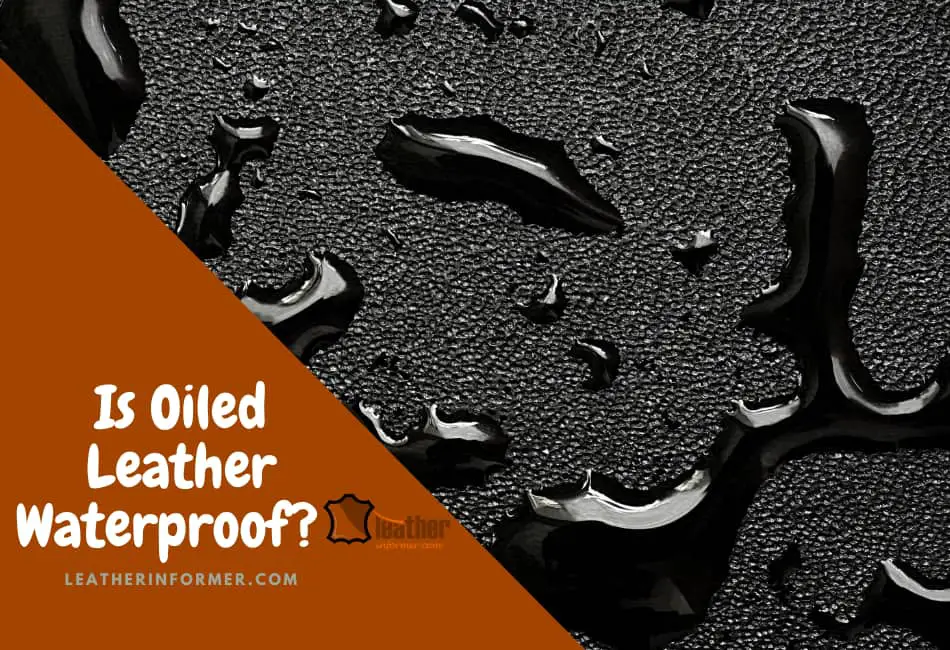Oiled leather is a popular choice for many leather items, from shoes and bags to jackets and wallets. With its distinctive appearance and luxurious feel, oiled leather can be an ideal choice for fashion-conscious individuals looking for a durable material that stands out in any crowd.
But is oiled leather really waterproof? In this article, we’ll dive into the truth about whether oiled leather really is waterproof and outline the limitations of this popular material. We’ll also explore alternatives to oiled leather for those who are looking for a truly waterproof material that can stand up to any weather or environment.
With this information, you’ll be able to make an informed decision about which type of leather will best suit your needs.
So let’s get started and uncover the truth about oiled leather!
Understanding Oiled Leather
Oiled leather is a type of full-grain leather that has been treated with oil wax to make it more supple and resilient.
While the oil treatment process can vary depending on the type of leather and desired effects, in general, it involves applying a layer of oil and wax to the hide, which is then left to soak into the leather.
This process can also be used to create unique effects such as burnishing or distressing.
Oiled leather has several distinct characteristics that make it desirable for many applications. It is soft and pliable, making it comfortable to wear or hold, while the oil treatment gives it a unique look that other leathers may not have.
Additionally, oil treatments help to prevent dirt and moisture from seeping into the leather, making it easier to clean and maintain.
However, despite its many advantages, there are some common misconceptions about oiled leather’s ability to repel water.
Water Resistance vs. Waterproofness
The key to understanding oiled leather’s water-repelling qualities lies in the distinction between water resistance and waterproofness.
Water resistance refers to a material’s ability to resist the penetration of water, while waterproofness is its ability to keep out all water completely.
Oiled leather has excellent water resistance, meaning that it can resist the penetration of water while still allowing moisture to pass through.
This is because the oil treatment helps to in the pores of the leather, making it difficult for water molecules to enter.
However, this does not make oiled leather waterproof— its water-resistant properties are limited and will eventually wear off with use or time.
To ensure that your leather items remain resistant to water, you’ll need to reapply oil treatments periodically.
Water repellency is one of the key properties of oiled leather. When properly treated with oil, it can resist water and moisture to a certain degree, making it ideal for applications where it may come into contact with liquids, such as footwear or bags.
However, even though oil treatments can help to repel water, oiled leather is not entirely waterproof. Over time, the oils and wax used in the treatment will break down or wear away, resulting in a gradual loss of water repellency.
For this reason, it’s important to understand that oiled leather may not be suitable for applications where complete waterproofness is required.
How Oil Treatments Affect Leather
The performance of oiled leather also depends on the type of oil treatment used. Different oils and waxes can have a variety of effects on the material, such as increasing its water resistance or making it softer and more pliable.
However, with continued use and wear and tear, even the highest quality oils will eventually begin to break down, resulting in a gradual loss of water repellency.
Additionally, some oils may darken the leather and cause it to lose its original color over time. Therefore, it is important to choose an oil treatment that will not only protect the leather but also preserve its original look.
Water-repellent Properties of Oiled Leather
Oiled leather has many advantages over other types of leather. It is often used in the production of bags, wallets, and shoes because it can stand up to all kinds of weather conditions and wear better than other types of leather.
But what makes oil leather particularly good for these applications is its water-repellent properties. Here are some of the outstanding features of oiled leather:
• It is soft, pliable, and comfortable to wear.
• The oil treatment helps to resist dirt and moisture, making it easier to clean and maintain.
• It has excellent water resistance, meaning that it can resist the penetration of water while still allowing moisture to pass through.
• It can resist water and moisture to a certain degree, making it ideal for applications where it may come into contact with liquids.
Despite its many advantages, however, oiled leather is not completely waterproof. With time and continued use, the oils used in treatments will eventually break down or wear away, resulting in a gradual loss of water repellency.
Factors Influencing Water Resistance in Oiled Leather
1. Leather Quality
The water resistance of oiled leather depends on the quality and type of leather used. Full-grain leather, which preserves the natural grain and surface features, is generally more water-resistant than lower-quality leather.
2. Oiling Technique
The water resistance of oiled leather can be influenced by the kind and technique of oil used in treatment. Various oils have different levels of water repellency, and the way they are applied can also affect the leather’s ability to repel water efficiently.
3. Oil Penetration
The water resistance of oiled leather is affected by how deeply the oil gets into the fibers. If the oil penetrates properly, it can create a barrier that repels water and prevents it from soaking through the leather.
4. Thickness of Leather
Leather that is thicker tends to have higher water resistance because of its denser structure, making it more effective at repelling water. Thinner leather, however, may be more vulnerable to water absorption and potential damage.
5. Surface Finish
Certain types of oiled leathers are coated with a protective surface finish after being treated with oil. The purpose of this finish is to provide additional water resistance by creating a barrier that prevents water from coming into direct contact with the leather fibers.
6. Leather Conditioning
To keep oiled leather water-resistant, it is important to perform regular conditioning and maintenance. You can use conditioning products that are made specifically for oiled leather to restore water repellency, replenish oils, and maintain the leather’s suppleness.
7. Environmental Factors
The ability of oiled leather to resist water can be affected by external factors like temperature, humidity, and exposure to sunlight. If exposed to water for prolonged periods or in high humidity conditions, the leather’s ability to repel water may diminish over time.
Care and Maintenance of Oiled Leather
Although oiled leather is more water-resistant than other types of leather, it still requires proper care and maintenance to keep it looking its best.
- Regular cleaning and conditioning will help preserve the leather’s texture and color, as well as its water-repellent properties.
- Cleaning should be done with a soft cloth and saddle soap, while conditioning can be performed with products specifically designed for oiled leather.
- It is also important to keep oily leather away from high temperatures and excessive sunlight, as these can cause the oils in the leather to break down faster.
- Oiled leather can be a great choice for shoes, bags, and other items that may come into contact with water.
With proper maintenance, it can retain its water-resistant properties for many years to come.
Conclusion
Oiled leather is an excellent choice for shoes, bags, and other items that may come into contact with water. While it isn’t completely waterproof, its unique characteristics can make it a great option when looking for durable and stylish protection against the elements.
By taking factors such as quality, oiling technique, the thickness of the leather, surface finish, and environmental conditions into consideration when making your selection, you can ensure that you get the right type of oiled leather to suit your individual needs.
With proper care and maintenance, this material should be able to keep up its impressive water-resistant properties over time.

